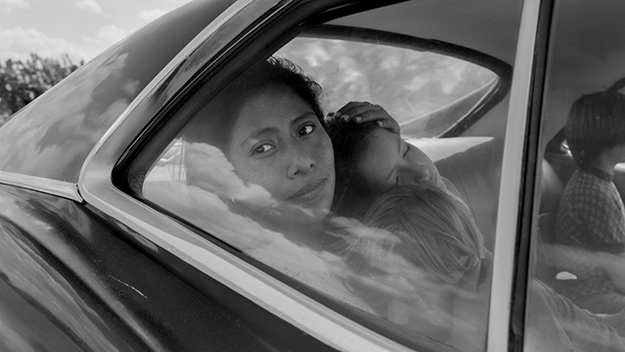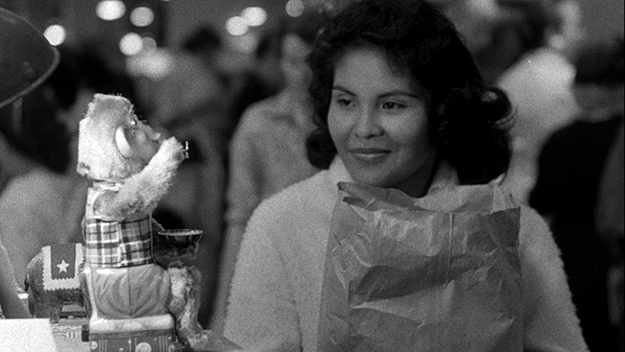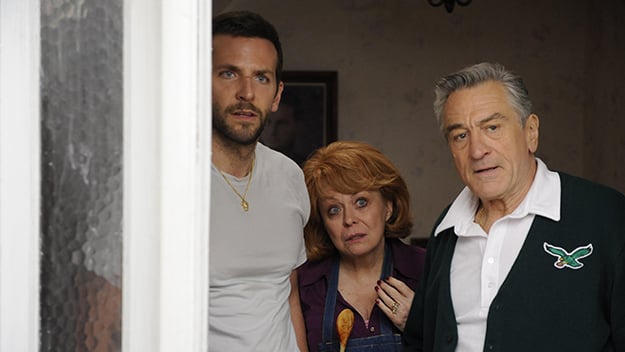Feeling Seen: Mi familia
Feeling Seen is a regular column focusing on personal reflections on films and featuring a different author every week. This week, Carlos Valladares reflects on his family’s complex relationship with the moving image.

Yalitza Aparicio as Cleo in Roma, (Alfonso Cuarón, 2018).
Among the thicket of memory-scenes that form Alfonso Cuarón’s Roma, one of the most devastating, for me, takes place inside the Cine Metropolitan in Mexico City. The film’s Mixtec lead, the maid Cleo (Yalitza Aparicio), has told her lover Fermín (Jorge Antonio Guerrero) that she’s pregnant with their child. After a long pause, Fermín excuses himself and slips out of the theater, leaving Cleo alone to watch the final reel of Gérard Oury’s La Grande Vadrouille (1966), an elephantine, sentiment-logged wartime comedy which was France’s biggest box-office hit for over forty years. (So much for French taste.) This unforgettable melancholic image—a pregnant Cleo finishing the film, alone and in the process of being abandoned, in a decadent ’40s movie palace, while Terry-Thomas floats over her distress with his gap-toothed RAF mugging schtick—does not reek of the irony or smugness you’d expect from such a jarring incongruity between screen and reality. It’s a moment that presents a truth, quiet and poker-faced: The moving image is not an aspirational model of what could be, but of what brutally is.
It’s the idea—also present in the knockout drab scenes inside theaters in Kent Mackenzie’s The Exiles (1961) and Barbara Loden’s Wanda (1970)—that the images beamed to Cleo and Yvonne and Wanda (to us, as well) are awash with banality. The ghastly thing is that these images are passionately involved with the world into which they send their gently mocking rays of light. And most of all, they make light of the audience who come to the cinema expecting a temporary reprieve from hardship, seeking a bit of hope, an ideal. A pregnant Apache woman in L.A.’s dying Bunker Hill, a pregnant Mixtec maid in 1970s Mexico City, a white housewife drifting around the coal mines and bars and hotel-rooms of Rust Belt Pennsylvania—all three are constantly reminded of their loneliness, whether walking down the street or sitting in a theater gazing at images of elusive beauty. In The Exiles, Yvonne can’t go home to her drunk husband, but the Bunker Hill theater isn’t much better—tortured, as she is, by the theater’s mindless kitschy jingles. (“It’s intermission time! For cherry lemon lime!”) Wanda goes to find some sleep at a matinee of a Mexican musical. She wakes up even more tired, her back aching, her wallet and money gone. These women turn to the cinema for a release that never comes.

Yvonne Williams in The Exiles (Kent Mackenzie, 1961)
My Hispanic family—made up of Honduran and, by way of my step-dad, Mexican immigrants—rarely voices our relationship to the moving image, even though it exists firmly within the Wanda–Exiles–Roma territory. My family and I were, and are, virtually drowning in images, undifferentiated, high and low alike—and most are hardly extraordinary or life-changing. Their shrinking size doesn’t help: the images got smaller and smaller on their inevitable, winding way from the Cine Metropolitan to VHS, to Telemundo primetime, to the bootlegs we bought outside the Superior Grocers in East Los Angeles.
My family and I have spent so much of our time in the unceasing stream of moving images, but what we watch has barely intersected. My mom has her über-extra telenovelas, which were omnipresent in my childhood (like that French caper in Cuarón’s cinema) but which I never had the patience to stick with over a season—which is odd, since watching a telenovela unfold is one of the biggest gather-round-the-table events for Hispanic and Latinx families, no matter age or gender. My love for melodramas didn’t develop until I was a senior in high school, and then it came through watching American classics: Wyler’s The Best Years of Our Lives (1946), Sirk’s Imitation of Life (1959). Somehow though, the stream of telenovelas that my mom loved (hammering strings, zoom-ins on weepy faces or exposed gotcha-bitch smirks of triumph) mentally prepared me for the lived-in, restrained devastation of Harold Russell and Juanita Moore that would, and still does, reduce me to sobs.
I recall a late night in 2016 when I walked into my mother’s room to find her crying. Distressed, I asked why: she told me she’d just seen The Judge, the 2014 film with Robert Duvall. She’d found it so riveting, so inspiring. Now, I had never seen The Judge, but I had long known my mom’s ardor for films set in courtrooms: Sidney Lumet’s 12 Angry Men and The Verdict and Jonathan Demme’s Philadelphia are among her favorites. A frustrated lawyer herself, she had gone to law school in San Pedro Sula, Honduras, and was set to take her bar exam when she dropped out in order to move to America, to raise me and my two sisters with my biological dad. Today, films like The Judge work as a salve for her after long nights working 5 p.m. to 2 a.m. as a Ross sales clerk, going on now for a decade. Her theater is cramped compared to Cleo, Yvonne, and Wanda’s, and is stacked to the ceiling with U-Haul boxes of old clothes and mementos of my grandmother that she refuses to throw out. In her downtime—the few hours between noon and 4 that she has to herself, before she’s off rehanging clothes tossed carelessly by customers across the rack—she watches telenovelas, TV movies dubbed into Spanish (Transformers is a regular item), and the occasional story about a defense lawyer razzing the prosecutor and impressing her judge, her clients, her audience. On her TV, she likes to see herself.

Bradley Cooper, Jacki Weaver, and Robert De Niro in Silver Linings Playbook (David O. Russell, 2012)
I have trouble talking to my mom or dad or step-dad about my own cinephilia, the kinds of things I see in the art I’ve made my life. I feel self-conscious about my Americanized language. I feel frustrated when I’m describing Jacques Demy to my aunt and don’t know the exact Spanish word for grace. I resign myself to the slang of classic American movies, knowing that my mom wanted me to speak English more than Spanish so that I wouldn’t have an accent. Recently though, we’ve finally found some common ground: David O. Russell. I can’t count how many times my mother has seen Joy and American Hustle. She loves those wild shouting-matches as much as I do. Perhaps because those families are as dysfunctional as ours, poisonous barbs flung between family members (Robert De Niro to Virginia Madsen, his soap-opera-obsessed ex-wife in Joy: “You’re like a gas leak: we don’t smell ya, we don’t see ya, but you’re killing us all”) that smack of unsugarcoated truth.
This past holiday season, the auteurist in me pushed me to tell her that Russell’s Silver Linings Playbook was on Netflix; maybe she should watch it. She did. I heard the tears again, on Christmas Eve—but this time compounded with absolutely ecstatic laughter. She told me she loved how crazy the family is, their quirkiness. Perhaps it was the pure kook of Jennifer Lawrence and Bradley Cooper, two neo-screwball heavies who maintain a mad hope that they’ll win a ballroom-dance competition despite the odds being hopelessly stacked against them, that resonated with her. What matters isn’t their dancing ability so much as their spirit, the spirit to keep moving and loving—and in the sloppiest, nuttiest way possible. I love the time we spend talking about Russell, and she does as well—because we’ve found something about which we can speak the same language. We only need to say the word “Joy,” and we immediately picture each other’s dreams, our fears, our painful pasts, the futures for which we toil.
But in those fleeting moments of connection—beyond plot, beyond language, beyond cultural context—I see something solemn pass across my mother’s face. I glimpse the inspiring, unexposed strength and poise that Yvonne, Cleo, Wanda, and my mother, carry within themselves. But it is only a glimpse. Later, she will continue channel-surfing, log into Netflix, log off, turn off her TV, and fall asleep at dawn, wondering whether her boss has spitefully changed her work schedule for the week without telling her—again.
Carlos Valladares has written for The San Francisco Chronicle, Criterion, and Gagosian Quarterly. He is from Los Angeles and lives in New York City.







